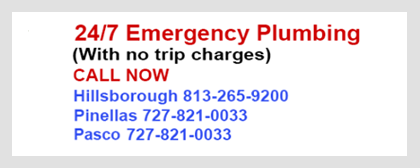Every Tampa homeowner has a clogged drain in their home at some point or another. While plumbing clogs can be a pain, it’s typically easy to fix.
However, when every drain begins backing up at once, a minor pain can become a major plumbing ordeal—and you may be dealing with a sewer drain clog.
Whether your sewer line is backing up or you just want to prevent that from happening, here’s what you need to know about the causes of sewer line backups and blockages.
THE 4 MOST COMMON CAUSES OF SEWER LINE CLOGS
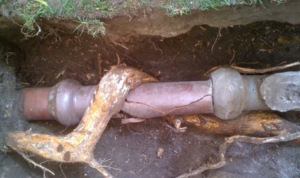 Sewer drain clogs can be caused by various factors, the most common of which include:
Sewer drain clogs can be caused by various factors, the most common of which include:
1) Tree roots: As tree roots grow, they can make their way toward your sewer line. If your sewer lines are aging, cracked, corroding, or otherwise damaged, tree roots can make their way into these pipes, interrupting the smooth flow of wastewater. Over time, the roots will expand. While that can bring dirt into your pipes, it can also create a full blockage. And when that happens, all the drains in your home will clog, and you may experience backups.
2)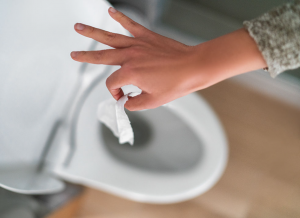 The toilets in your home: Treating your toilet like a trash can also cause sewer drain issues. Of course, you should avoid flushing foreign objects down your toilet. But did you also know that “flushable” wipes aren’t actually flushable? That’s why our expert technicians always recommend only flushing human waste and toilet paper. Flushing any other items down your toilet can cause sewer line clogs and major damage! Check out the full list of what you can and cannot flush down your toilet.
The toilets in your home: Treating your toilet like a trash can also cause sewer drain issues. Of course, you should avoid flushing foreign objects down your toilet. But did you also know that “flushable” wipes aren’t actually flushable? That’s why our expert technicians always recommend only flushing human waste and toilet paper. Flushing any other items down your toilet can cause sewer line clogs and major damage! Check out the full list of what you can and cannot flush down your toilet.
How to Detect and Prevent Tree Roots in Your Sewer Line
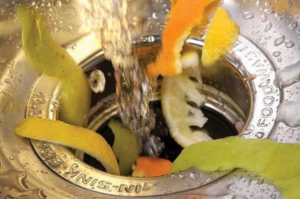 3) Your garbage disposal: Just like your toilet, your garbage disposal shouldn’t be used as a trash can. Throwing everything from grease to last night’s dinner remnants down your garbage disposal can make your drains clog quickly. So, make sure you have a kitchen sink strainer to catch bigger debris. And be sure to follow our tips on what you should not put down your garbage disposal.
3) Your garbage disposal: Just like your toilet, your garbage disposal shouldn’t be used as a trash can. Throwing everything from grease to last night’s dinner remnants down your garbage disposal can make your drains clog quickly. So, make sure you have a kitchen sink strainer to catch bigger debris. And be sure to follow our tips on what you should not put down your garbage disposal.
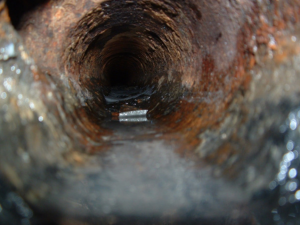 4) Damaged sewer line: Over time, your sewer line can crack, corrode, sag, and start to fail. These problems are far more likely to affect aging sewer lines, especially those that are more than 20 to 25 years old. And when sewer lines are damaged, dirt and other debris may enter the lines, and wastewater can’t flow through them as easily. That can quickly lead to clogs and sewer line backups.
4) Damaged sewer line: Over time, your sewer line can crack, corrode, sag, and start to fail. These problems are far more likely to affect aging sewer lines, especially those that are more than 20 to 25 years old. And when sewer lines are damaged, dirt and other debris may enter the lines, and wastewater can’t flow through them as easily. That can quickly lead to clogs and sewer line backups.
 SCHEDULE SEWER LINE SERVICE: CALL CASS!
SCHEDULE SEWER LINE SERVICE: CALL CASS!
 Cass Plumbing can diagnose and repair any sewer line problem fast! With more than 20 years of experience and state-of-the-art sewer line repair equipment, our expert Tampa plumbers are the team you can trust when it’s time to put a stop to sewer backups and other sewer line repair problems. Call us today at 813-265-9200.
Cass Plumbing can diagnose and repair any sewer line problem fast! With more than 20 years of experience and state-of-the-art sewer line repair equipment, our expert Tampa plumbers are the team you can trust when it’s time to put a stop to sewer backups and other sewer line repair problems. Call us today at 813-265-9200.



